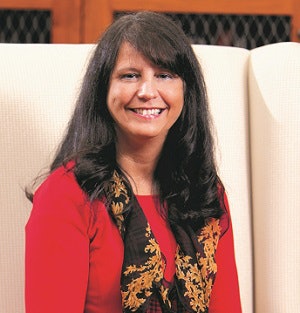Before beginning her law career, Dr. Annette Clark, who is dean of Seattle University School of Law, had her sights on medicine.
 Dr. Annette Clark
Dr. Annette ClarkDuring her time at the University of Washington’s School of Medicine, Clark found that practicing medicine was not for her. She discovered that she had far-below-average normal visual spatial abilities and hand-eye coordination, making it difficult to perform at a level that was consistent with her expectations, as well as the level needed to keep patients safe.
“While I could master the intellectual aspect of medicine, the actual art of it and practice eluded me,” says Clark. “It was one of those circumstances where I discovered my own limitations, so I just decided to pursue a career that allowed me to think and speak and write but didn’t require me to do it in the way that medicine did.”
Clark’s participation in medical-legal consulting while in medical school led her to pursue law further at Seattle University School of Law. Additionally, Clark found that transitioning from medical school to law school provided her with some additional benefits.
“Having been to medical school and then coming into legal education gave me a really nice ability to be able to compare medical education and legal education,” says Clark. “And I’ve been able to see some value in moving legal education closer to the medical model.”
She was hired by her alma mater to join their faculty during her third year of law school. Upon graduating, Clark took the bar exam and then immediately began teaching.
“It really reveals the power of having faculty who get to know you and mentor you,” says Clark. “I had two or three faculty members who encouraged me to go into the academy of teaching and mentored me throughout the application process.”
Teaching became a passion of Clark’s, due to her positive experience in law school and surrounding mentors. She has taught the first-year course, civil-procedure and health-law courses for upper-division students, including medical liability, bio-ethics in the law and remedy.
“[My draw towards teaching] was I think my love for both the law and the educational process,” says Clark. “Having mentors encouraging me to do it made a big difference. I’m not sure I would have realized that I could go into teaching and into the academy right out of law school if it hadn’t been for them encouraging it and suggesting it to me.”
After years of teaching, Clark transitioned into administrative leadership positions. She served as the associate dean for Academic Affairs and then vice dean at Seattle University over the course of 10 years, eventually becoming the interim dean in 2009. Additionally, she became dean and professor of law at Saint Louis University School of Law from 2011-12.
In 2013, after a year in St. Louis, Clark returned to her alma mater and became dean, making her the first alumnus chosen to lead the law school.
“It is pretty rare for a dean to lead her own alma mater,” says Clark. “I think it provides really nice evidence for prospective students for the quality of our degree and the confidence that the university has in our law school, that they hired a dean who is an alum. It also allows me to speak with great genuineness and depth about our law school, its culture and the quality of the program of legal education. For me, it is just such a joy to be able to serve an institution that provided me with this amazing career and the skills that I needed in order to be a faculty member and dean.”
Over the course of her career at Seattle, Clark has won many awards, including the Seattle Journal for Social Justice Faculty Award in 2005, the Dean’s Medal in 2006 and the Outstanding Teacher Award from the graduating class in December 2007 and December 2011.
As dean, Clark’s main focus is to make legal education more accessible to everyone. The law school has created multiple programs to provide more accessibility, including an access admissions program and a part-time evening program for students who work full time or have family responsibilities. Additionally, Alaska is the only state that does not have its own law school, so Seattle University School of Law created a satellite school in Anchorage.
According to Clark, 35-39 percent of the entering class at Seattle University School of Law are students of color. In addition, 11 percent of students self-identify as part of the LGBTQIA community and 10-11 percent of students are veterans.
“It is important to work on how we can make law more accessible so students can come and join what I think is an incredible, noble profession,” says Clark. “I think continuing to focus on accessibility is important, particularly because legal education has gotten so expensive. We are doing our best and our part to really change the face of our legal profession.”
This article appeared in the July 12 issue of Diverse. This is the last in a series of stories about law school deans.



















